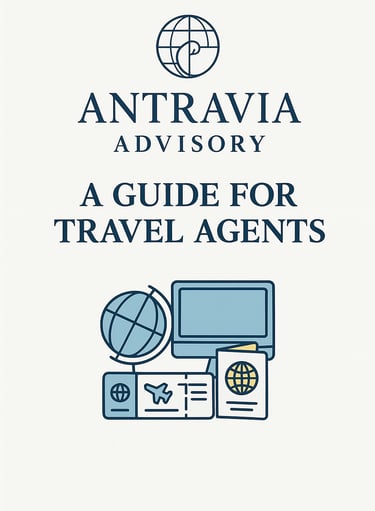
Travel Agent Finance Guide 2025: Host Agency vs Independent
Part 1.2 of the Antravia Travel Agent Finance Guide walks through one of the most important structural decisions every advisor faces: whether to join a host agency or go fully independent. We break down the financial implications, commission splits, support systems, licensing, and long-term strategy behind each model, so agents can choose what’s right for their business.
ANTRAVIA TRAVEL AGENT GUIDE
1/3/20257 min read


Part 1 – Becoming a Travel Agent the Right Way
In the opening section of our Travel Agent Finance Guide, we focus on what separates thriving travel advisors from those who struggle. This part examines income benchmarks across the industry, why few agents reach six figures, and how top performers structure their businesses differently. We look at the role of planning fees and diversified revenue, analyze shifts in client demand, and share case studies of agents who have built sustainable models. The goal is to give a clear picture of what financial success looks like in practice—and how you can position your agency to achieve it.
1.1: The Industry Today
The size of the U.S. travel advisor market — real data and revenue benchmarks
Where growth is happening: luxury, corporate, cruises, groups, wellness
How host agencies dominate the landscape — and why they remain popular
The rise of independent advisors and what’s changed post-2020
2024–2025 outlook: who is spending, and where
1.2: Host Agency vs. Independent
What a host agency actually does: commission splits, supplier access, support
Key financial differences: overrides, insurance, credit card processing
Hidden costs and contract clauses that affect your bottom line
When to move away from a host: red flags and readiness benchmarks
Real examples of agents transitioning — both successfully and not
1.3: What Successful Agents Do Differently
Why most agents fail: pricing mistakes, poor systems, burnout
Traits of top advisors: proactive pricing, real tracking, strategic delegation
What high-performing agents track: revenue per client, time spent, margins
Adding fees to commissions: what works and where
Case studies from Antravia clients who scaled strategically
1.4: Understanding Client Demand in 2025
Why Gen Z, Millennials, and luxury Boomers are driving change
Growth in niche segments: food travel, rail, wellness, sustainability
77% of travelers want personalization — and what that means for advisors
What’s actually selling now — and how agents can reposition around it
How to price your expertise in a shifting buyer landscape


Part 1.1 - The Industry today - click here for this section
Part 1.2 - Host Agency vs Independent – Which model works financially in 2025? Antravia guide
One of the first financial decisions every travel agent faces is whether to work under a host agency or establish a fully independent agency. Both structures can generate profit, but the costs, risks, and benefits differ significantly.
In 2025, with average travel agent sales growing and thus more revenue streams available beyond supplier commission, there is a clearer point where moving away from a host begins to make financial sense. This will be discussed in the next section.
How does a Host Agency operate?
A host agency is a licensed and accredited travel business that allows independent contractors to operate beneath its umbrella. The host typically provides access to ARC or IATA accreditation, supplier relationships, booking systems, consortia membership, and Errors and Omissions (E&O) insurance. In return, the travel agent shares part of their commissions or pays a monthly fee (or both).
According to Host Agency Reviews’ 2024 report (reference below), most hosts in the United States offer commission splits ranging from 70/30 to 90/10 in favor of the advisor. Many also charge membership fees of USD$ 50 to USD $200 per month. The host’s network often includes a consortia affiliation, such as Virtuoso or Signature Travel Network, giving travel agents access to preferred rates, overrides, and marketing tools they could not secure independently without paying to join such programs directly. Costs to join directly would be in the range of USD$ 1,000 to USD$ 5,000 annually
For agent advisors generating under USD$ 400,000 in annual sales, staying with a host generally results in higher net income because the host absorbs accreditation, insurance, and system costs while providing overrides and marketing support. Hosts also act as the Merchant of Record in many cases (see our blog on MoR), which reduces legal and financial exposure by handling supplier payments, refunds, and chargebacks on the advisor’s behalf.
What does Independence really require?
Operating as an independent agency means securing one’s own ARC or IATA accreditation, supplier relationships, E&O insurance, booking systems, and financial controls. The upside is keeping 100% percent of commissions and overrides, but fixed costs are substantial.
ASTA’s 2024 member data shows that a small independent agency typically spends USD$ 8,000 to USD$ 15,000 annually on accreditation, insurance, GDS or booking platforms, and accounting systems. Additional costs for staffing, marketing, and legal compliance can bring that total to USD$ 20,000 or more per year, depending on the agency’s scale.
Independent agents must also manage tax and reporting obligations that are handled automatically when working with a host. These include applying for and maintaining an Employer Identification Number (EIN), complying with Beneficial Ownership Information (BOI) reporting, issuing and collecting 1099s for contractors, and handling state-specific business filings. While these are routine tasks for an established agency, they can be time-consuming for an advisor transitioning from a host model, especially if the host agency was providing full accounting support.
Acting as the Merchant of Record (MoR) also exposes independent agencies to greater financial risk. For example, chargebacks, cancellations, and supplier defaults can all impact cash flow and profitability. These risks can be mitigated through well drafted client contracts, supplier deposit structures, and the use of third-party payment platforms, but they are responsibilities the agent must actively manage.
Where the numbers potentially shift
Financially, the break-even point between a host and full independence is clearer now than in prior years. Based on figures from ASTA and Host Agency Reviews, an advisor producing USD$ 600,000 to USD$ 700,000 in gross annual sales, particularly with a focus on cruises and packaged travel, where commissions can reach 12% to 16%, often benefits financially from becoming independent.
Consider these three scenarios, based on 12% average commission:
1. At USD$ 400,000 in annual sales (typical for a growing part-time or new agent advisor):
Commission earned: USD$ 48,000.
Under a host (80/20 split): Advisor retains USD$ 38,400 after split, minus USD$ 1,200 annual membership fee.
Independent: Agent keeps all USD$ 48,000 but incurs around USD$ 12,000 dollars in fixed costs (e.g. accreditation, insurance, systems).
Result: Host structure yields roughly USD$ 38,000 net versus USD$ 36,000 as an independent.
2. At USD$ 650,000 in annual sales (established agent, possibly also cruise-heavy):
Commission earned: USD$ 78,000.
Host (80/20 split): Agent retains USD$ 62,400 after split, minus USD$ 1,200 in fees = USD$ 61,200 net.
Independent: Advisor keeps all USD$ 78,000, minus USD$ 12,000 in costs = USD$ 66,000 net.
Result: Independence yields about 8% more profit, even after expenses.
3. At USD$ 1.2 million dollars in annual sales (full scale agency):
Commission earned: USD$ 144,000.
Host (90/10 split): Agent retains USD$ 129,600, minus USD$ 2,400 in fees = USD$ 127,200 net.
Independent: Agent keeps all USD$ 144,000, minus USD$ 18,000 in costs = USD$ 126,000 net, but with USD$ 24,000 dollars in negotiated supplier overrides, total net rises to USD$ 150,000 dollars.
Result: Independence generates nearly 30% more income once overrides are included.
Case Study: Combining models?
Not all travel agents choose one structure exclusively. A mid-sized agency based in New York, with USD$ 750,000 in annual sales, uses a hybrid approach. Air and cruise bookings, which carry higher liability, are processed through a host, while hotels and DMC services are booked directly as an independent entity. According to figures the agency shared in a 2024 ASTA panel, this approach saves roughly USD$ 10,000 per year in host fees while still leveraging the host’s legal protections and systems for the riskiest bookings. The hybrid structure can work well for advisors in the USD$ 400,000 to USD$ 800,000 sales range who are growing but not ready to assume full Merchant of Record responsibilities.
The bottom line - Antravia view
For advisors in 2025, the decision between a host and independence is not just about commission splits. It is also a balance of sales volume, risk tolerance, and administrative capacity.
Advisors generating less than USD$ 400,000 annually, or those preferring a lean operation with minimal paperwork and financial exposure, usually benefit from staying with a host. Those with sales approaching USD$ 600,000 to USD$ 700,000 dollars can often earn more by moving to independent, especially if they focus on cruise and package sales where commissions and overrides can add significant income.
Hybrid models offer a middle ground, allowing advisors to control risk while gradually building systems and supplier relationships before fully leaving a host. Regardless of the structure, maintaining clear financial tracking, strong contracts, and disciplined cash flow management is essential to building a profitable and sustainable travel business.
References for 1.2
Host Agency Reviews (2024 Travel Advisor Survey) – Host Agency Reviews states that most U.S. host agencies offered commission splits ranging from 70/30 to 90/10 in favour of the advisor in 2024, and that advisors charged membership fees between USD 50 and USD 200 per month. They also note that hosted advisors who charge planning fees earn an average of 42 percent more income than those who do not.
Link: https://hostagencyreviews.com/blog/2024-preliminary-data-hosted-travel-advisorsHost Agency Reviews (Commission Guide) – According to Host Agency Reviews’s breakdown of commission structures, hosts typically negotiate higher base commission rates from suppliers—allowing advisors to sometimes earn more with a split than working independently. Commission levels often range from 10–20 percent, depending on the product.
Link: https://hostagencyreviews.com/blog/travel-agent-commissionsTravel Agent Pro – Travel Agent Pro notes that new advisors typically receive commission splits of 70/30, experienced advisors around 80/20, and top producers up to 90/10—reflecting tiered models based on performance.
Link: https://travelagentpro.com/how-to-travel-agent/no-experience-no-problem-how-a-host-travel-agency-can-kickstart-your-travel-businessAmerican Society of Travel Advisors (ASTA) – ASTA membership dues for independent advisors (under USD 1 million in sales) are USD 247 per year, according to ASTA’s official membership guide, and independent agencies often spend USD 8,000–15,000 per year on accreditation, insurance, and booking systems. ASTA membership also provides legal protection, supplier relationships, and access to the Verified Travel Advisor certification.
Link: https://www.asta.org/membership/join-renewASTA Verified Travel Advisor (VTA) Certification – ASTA’s program pricing shows that certification costs USD 399 for members and USD 627 for non-member advisors, including one year of ASTA membership—illustrating part of the overhead an independent advisor might manage.
Link: https://my.asta.org/ASTA/Certification/Verified_Travel_Advisor_Program_Details.aspxASTA / Travel Weekly – Travel Weekly confirms that ASTA has evolved to represent 80 percent of all travel sold in the U.S. through agency channels, making their data and membership highly relevant to advisors choosing between host and independent models.
Link: https://www.travelweekly.com/Travel-News/Travel-Agent-Issues/ASTAs-membership-drive-faces-challenges-TW-survey-findsTicketingHub Blog (Host Agency Reviews data recap) – TicketingHub’s recent summary cites Host Agency Reviews reporting that experienced advisors often earn USD 50,000 or more annually, with 25 percent earning over USD 100,000 per year in hosted advisor settings.
Link: https://www.ticketinghub.com/blog/how-much-do-travel-agents-make
Antravia Advisory
Where Travel Meets Smart Finance
Email:
Contact us:
Antravia LLC
© 2025. All rights reserved. | Disclaimer | Privacy Policy | Terms of Use | Accessibility Statement
Antravia.com - Global site of the Antravia Group.
Antravia.com | Antravia.co.uk | Antravia.ae |
Finance.travel | Tax.travel | Consultancy.travel | VAT.travel | VAT.claims |
USSales.tax | EuroVAT.tax | UKVAT.tax |
contact@antravia.com
Antravia LLC
4539 N 22nd St., Ste. N
Phoenix
Arizona
85016
